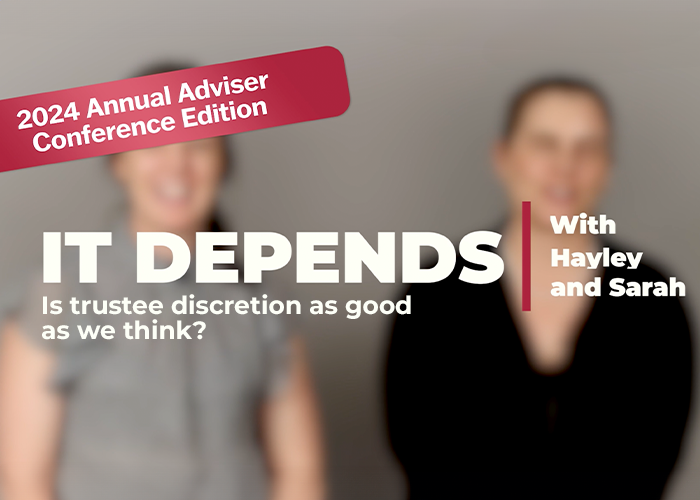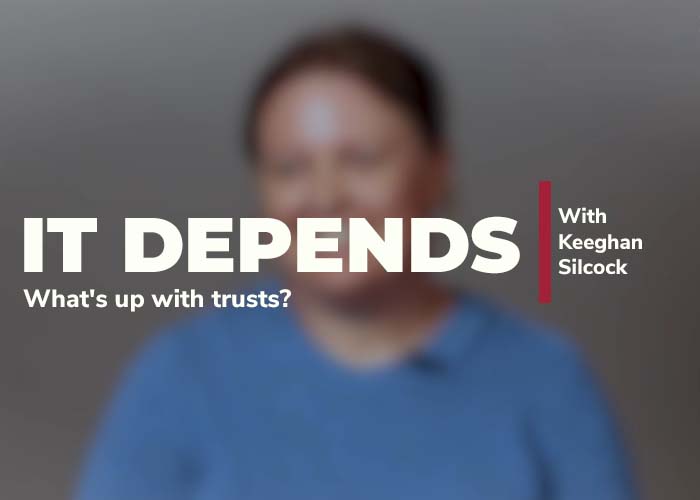In this edition of ‘It depends’, partner Hayley Mitchell and associate Sarah Camm talk about trustee discretion: what decisions of trustees involve discretion and what happens when the trustee gets it wrong.
Hayley and Sarah will be covering this topic in more detail at our Annual Adviser Conference on 21 and 22 March during their session ‘Is trustee discretion as good as we think?’. Register now to attend live at Sofitel Brisbane or virtually.
Video transcript
Hi and welcome to this week’s edition of It Depends. This week we’re speaking about trustee’s discretion in the lead up to our Annual Advisor conference, where Hayley and I will be speaking about this topic in a little bit more detail.
What decisions of trustees involve discretion?
It will depend on the terms of the trust deed of course, but many decisions that trustees of discretionary trusts in particular make will involve an exercise of discretion. So, that can include things like trust distributions, whether they’re changing the terms of the trust deed or adding or removing beneficiaries of trusts. Also, trustees of self-managed superannuation funds or any superannuation fund will be exercising discretion a lot of the time, if they’re deciding how to pay a death benefit. Discretion also extends to whether the trustee should look at exercising a discretion. So, the first question isn’t whether how much income the trustee distributes, but whether the trustee distributes any income at all, for example.
Does the trustee have absolute discretion or can their decision be challenged?
Whether a trustee has absolute discretion is again really going to be determined by the terms of your trust deed. Typically, where we are dealing with a family discretionary trust, for example, a lot of trust deeds will specifically state that ‘a trustee has absolute and unfettered discretion’. But, that doesn’t mean that the trustee can do whatever they like without properly considering first, the purpose of the trust and the range of beneficiaries. So, when a trustee is making its decision, it really needs to give genuine consideration to those issues that Hayley just mentioned, the beneficiaries that it’s considering, the purposes of the decision it’s making and the purposes of the trust. There are a couple of other factors that the trustee really has to meet in order to avoid their decision potentially being challenged, and that is acting honestly and in good faith and to act for a proper purpose of the trust, which really extends to not benefiting people that are not objects or beneficiaries of the trust. So, disappointed beneficiaries might challenge the decision of the trustee if they think that the decision of the trustee was made without a proper purpose or without having genuine consideration to those issues.
What happens when the trustee gets it wrong?
If a beneficiary is disappointed by a decision of the trustee, they could apply to the court seeking for the trustee to be removed. And if they’re successful in that application, they might also have their costs paid, for example. Typically, what you won’t see though, is the court substituting the trustees decision. So, the court may determine that if the trustee had made a decision without proper purpose, for example, they might unwind that decision, but they won’t then substitute it for a different decision. Really, the only outcome that we usually see in these cases is the removal of the trustee, an appointment usually of an independent trustee.
How to get it right
So, really, a trustee needs to have regard to the terms of the trust deed and those three factors that we’ve previously mentioned, acting honestly and in good faith, acting in a proper purpose of the trust and having genuine consideration for the class of beneficiaries and the purpose of the trust. The trustee doesn’t need to show reasons why it made its decision. The trustee will need to show that it followed a proper decision making process when it came to its decision.
Hayley and I will speak about some of those issues and some of the things that a trustee can do to document that process. In our session at the Annual Advisor Conference in March. Come along and check it out.





